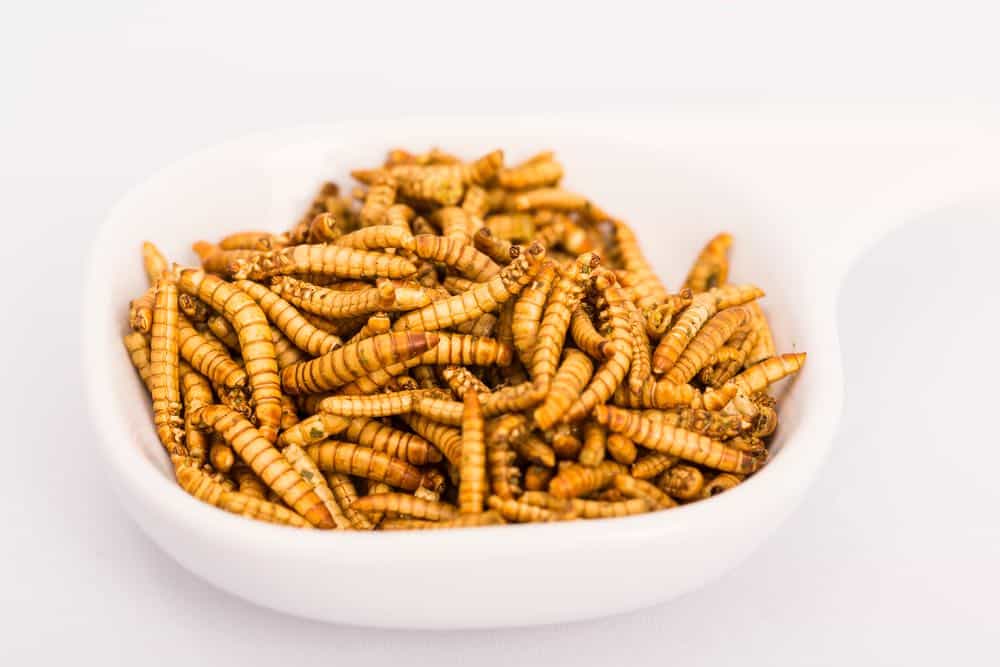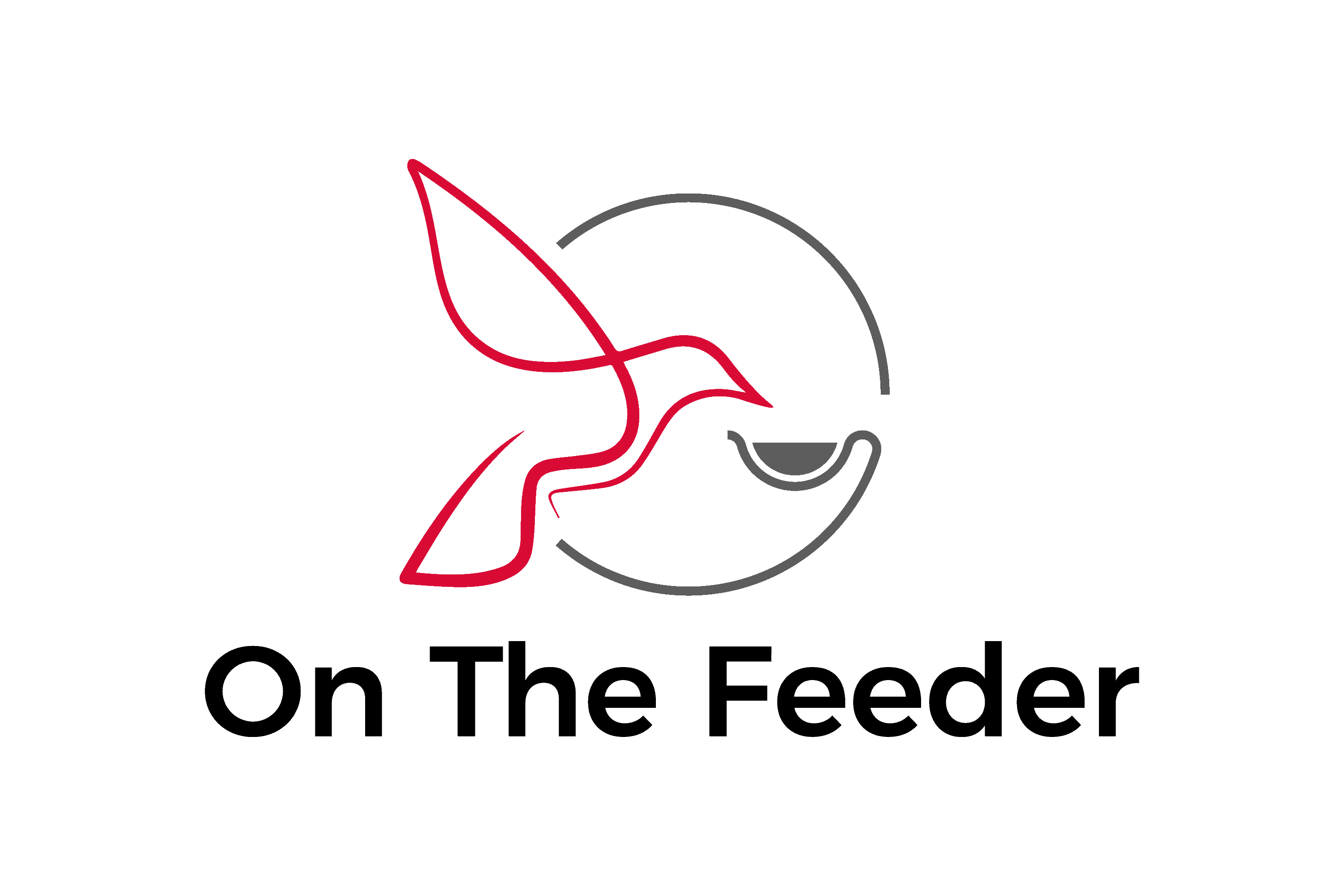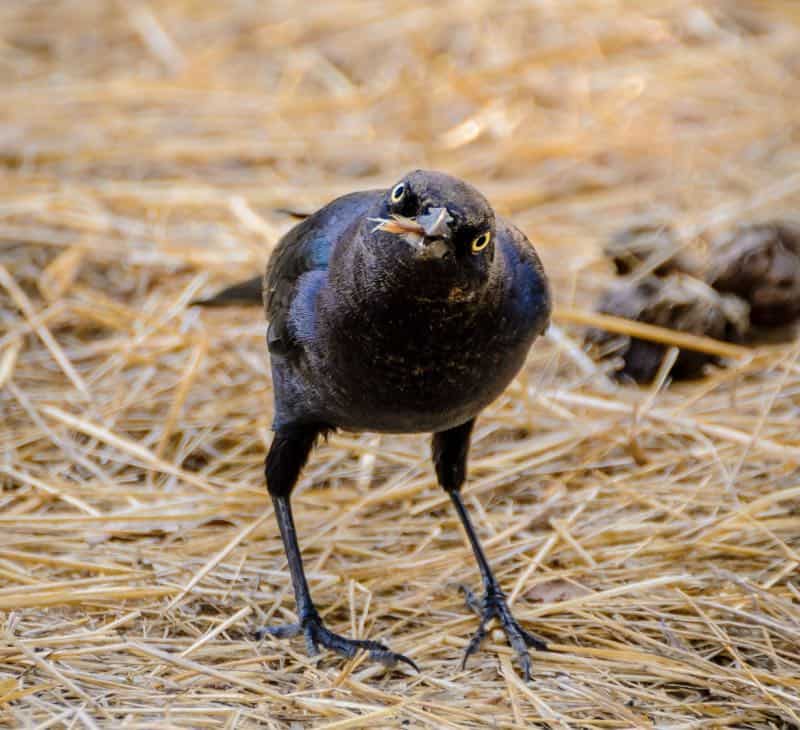Inside: This article is a deep dive into everything crows eat (including baby crows), whether crows are omnivores, what to feed crows in your yard, and even what you should not feed crows.
There are more than 40 species of corvids in every continent except South America and Antarctica. Crows are among the smartest animals in the world and use their intelligence in procuring food.
Are crows omnivores?
Yes, crows are omnivores, meaning that they will eat plants and animals. In fact, crows can more appropriately be described as opportunistic eaters because they’ll consume nearly anything edible that they find.
They’re scavengers with minimal dietary restrictions, which allows them to eat a diet of nearly anything. What do crows eat? We’ll take a look at why crows can eat nearly anything, their diet in the wild, and what you can feed them if they come to your yard.
Why Crows Can Be Such Opportunistic Eaters
Crows have large forebrains, which is an adaptation that has given them the ability to survive in environments where finding food may be challenging. They’ve even learned to flip over poison frogs before eating them to avoid their poison glands.
Interestingly, scientists say that crows are among common birds with smaller olfactory bulbs and weaker senses of smell. They hypothesize that crows’ enhanced brainpower has decreased their need for a strong sense of smell to find food.
However, crows’ bills have evolved with a unique pattern that gives them a stronger and more precise grip, which allows them to manipulate tools to acquire food.
A crow’s stomach acid is also extremely acidic (1.3 pH), which is true for many scavenger and omnivore birds. Researchers hypothesize that having an extremely acidic stomach allows birds like crows to safely digest pathogens in rotten foods and dead animals that might harm others.
The Crow Diet
Crows can easily flourish in a variety of environments because they can find food and eat foods that other animals may not be able to access or eat.
Thus, they can make the most out of the available food in their surroundings. When it’s not breeding season, they will travel as far as 40 miles away from their roosts to find food. They often travel together and post sentries to alert feeding birds of any danger.
What do crows eat in the winter? Like many other birds, crows also tend to stock seeds, grains, nuts, and other foods before it gets cold. They also hunt animals or reptiles that are weaker during the cold. They may also dig for worms and insects from the ground.
Any time they can’t easily find food in the wild, they scavenge through human trash.
What do crows eat in the wild? They feast on a variety of categories of foods, including:
- Arthropods
- Worms and caterpillars
- Plant products
- Animals
- Birds and eggs
- Scavenged and stolen food
- Feces
Do crows eat worms, grass, chipmunks, vegetables, and apples? Let’s look more closely at their diet to see what people have observed them eating.
Arthropods and Worms

Crows’ beaks allow them to find meals in places that are not easily accessible, such as in the ground. New Caledonian crows (Corvus moneduloides) even use tools they make from sticks or leaf stems to “fish” out grubs and larvae from deadwood.
What do crows eat on the lawn? Their unique beaks and tool usage allows them to enjoy a wide variety of arthropods from your lawn, including:
- Spiders
- Ants
- Beetles
- Grasshoppers
- Crickets
- Butterflies
- Millipedes
- Worms
- Caterpillars
- Insect larvae
Plant Products
Crows also consume a wide range of plant products. They’re even known to drop hardshell nuts into the street so that cars can roll over them and crack them.
- Nuts
- Seeds
- Grains
- Fruit
- Vegetables
- Plants
Animals
While crows are opportunistic scavengers, they hunt for food as well. However, they mainly hunt small, young, or weak animals that are easy prey.
Crows are known for raiding nests for baby birds and eggs. They are also capable of eating birds who are weak or injured. Eating other birds is not a crows’ favorite food, though. They’re simply attracted to whatever is effortless to prey and will hunt for anything that will not fight back.
There is no shortage of videos on Youtube depicting a crow attacking or eating other birds’ babies. I didn’t have the stomach to include one but you’re welcome to check out YouTube. I did find this video I’d like to share of a crow attempting to snack on a live baby duck – but momma duck would not have it!
Even shellfish are no problem for crows. They simply drop the shells on rocks to rocks below to crack them open and reveal the flesh.
Some small animals that crows hunt include:
- Mice
- Voles
- Chipmunks
- Squirrels
- Fish
- Shellfish
- Lizards
- Salamanders
- Frogs
- Snakes
- Invertebrates
- Baby birds
- Bird eggs
Scavenged and Stolen Food
In an urban setting, crows aren’t averse to going through the trash and picking out any scraps of food that they can find. According to BirdLife International, living among humans has increased their population by nearly 20% each decade of the last 40 years.
Crows are known to take advantage of food left by other birds or even steal from other birds, including their magpie cousins. They are capable thieves, and it’s common for them to steal other birds’ food, including eggs.
As scavengers, crows also enjoy carrion (the decaying flesh of dead animals). However, carrion only makes up a small percentage of what they eat.
Feces

Crows are even consumers of feces. They will eat feces from their nestlings when they are nutritionally stressed, especially during the first few days after their nestlings hatch when nestling feces is more nutritionally dense.
Crows also eat dog, cattle, and other animal feces. There have even been reports of dog poop bags that crows have left hanging in trees above garbage bins after dining on dog poop.
Feeding Crows
People attract crows to their yards for a variety of purposes. Some people just like corvids. Others are hoping for a crow “friendship. Still, others use crows to eat unwanted insects and grubs damaging their garden.
However, before trying to attract crows to your yard, it’s necessary to ensure that there are no ordinances in your area forbidding leaving food out for wild animals. Some local governments discourage feeding crows lest they start to congregate and become a nuisance.
Having tempting foods in your backyard is one way to attract crows to your yard. It’s usually okay to leave out normal bird food, but it’s never a good idea to leave out food and unlidded trash bins that could attract unwanted animals like mice or raccoons in addition to crows.
If you want to keep crows in your backyard to enjoy longer, you might consider making them work for their food by solving a puzzle. Making getting to food a challenge can also prevent attracting other varmints to your yard.
If you’re interested in knowing the meaning and symbolism associated with crows, check out The Ultimate Guide to Crow Symbolism.
What to Feed Crows
What can I feed crows in my yard? If you want to feed crows, you can provide them with a variety of different foods, including:
- Bird food
- Nuts
- Grains
- Fruits
- Berries
- Vegetables
- Meat-Related Foods
Bird Food
Bird food that crows enjoy that they will eat from your feeders or scattered in your yard include:
- Black oil sunflower seeds
- Pumpkin seeds
- Dried corn
- Millet
- Mealworms
- Suet
Nuts
Crows also enjoy a large variety of nuts. A few salted nuts are okay because birds need salt to survive. Nuts you can try scattering in your yard for crows include:
- Walnuts
- Shelled or unshelled peanuts
- Hazelnuts
- Almonds
Grains
Some grains that crows enjoy include:
- Oats
- Wheat
- Barley
- Buckwheat
- Sorghum
- Rice
Fruits
While crows aren’t as attracted to fruit as to other foods you might offer them, they probably won’t turn down any of these fresh and dry fruits if you offer them:
- Apples
- Bananas
- Oranges
- Grapes
- Cherries
- Figs
- Raisins
Berries
Berries are a favorite food for crows. Having plants in your yard that bear berries that crows like can keep them coming back year after year. Some berry varieties they enjoy include:
- Pokeberries
- Juniper berries
- Cranberries (not the dried type with sugar)
- Blueberries
- Blackberries
Vegetables
What do crows eat in the garden? If you have a garden full of greens, you’ll be happy to know that crows aren’t as likely to eat some green veggies like celery, lettuce, and cabbage. However, they will eat other foods from your garden and vegetables that you feed them, including:
- Pumpkins
- Peas
- Peppers
- Tomatoes
- Sweet corn
- Cooked potatoes
- Cooked beans
Meat-Related Foods
Crows love meat and are happy to eat any meat that you put out for them:
- Raw or cooked chicken or duck eggs
- Small pellet dog or cat food (soak in water first to moisten)
- Wet dog or cat food
- Chicken and other meat
- Meat fat (especially from chicken and ducks)
- Seafood
I don’t recommend spoon-feeding any wild birds but this video of a man literally spoon-feeding a crow cracked me up. Check it out.
Feeding Baby Crows
What do baby crows eat? Baby crows eat what their mothers bring them for the first few weeks of their lives. Their parents can provide them with worms, grasshoppers, crickets, and other insects. They will also eat tiny fruits, nuts, and seeds.
When they’re about six weeks old, baby birds learn how to hunt and look for food for themselves.
If you have found an abandoned baby crow, keep in mind that the Migratory Bird Treaty Act of 1918 makes it illegal for anyone except licensed wildlife rehabilitators to keep a crow. Therefore, if you’ve found a baby crow, you should get it to a wildlife rehabilitator as soon as possible.
So, there are very few instances where you should actually feed a baby bird of any kind. The video I’m about to share shows a woman feeding a baby crow that was abandoned by its mother and in danger of harm by neighborhood cats. Per the video comments, she apparently contacted a wildlife rehabber and obtained approval and direction to feed him. He’s so cute! I laughed until the end 🙂
If you need to feed a young crow temporarily, as in the case of the video about where the person received approval from their local wildlife rehab organization, it’s important to feed it a balanced diet with lots of protein to mimic the type of food it would receive from its parents. You can put some of the following foods together to make baby crow food:
- Oatmeal or baby cereal
- Hard-boiled egg yolk
- Soft dog food or cat food
- Raw beef hearts or kidneys
- Eggshells
- Bird vitamins
It’s essential to soak or chop everything before providing it to your birds like you would for a human infant. You can feed it to them from the tip of your finger.
If you’ve found a baby crow that’s older than six weeks old, you can feed it most of the same things you can feed adults.
What Should You NOT Feed Crows?
You can feed a crow anything, but should you? Researchers took blood samples from 140 crows in urban California and found that the crows that lived in more urban surroundings had higher cholesterol from eating human food.
Interestingly, cholesterol doesn’t have the same negative effects on birds as it does on humans. In fact, it seems to boost their body conditions. Still, we don’t have an idea of how much cholesterol would be an excessive level for crows.
While we may not need to worry about giving crows cholesterol problems from feeding them human foods, there are some foods that are bad for crows:
- Bread: A little is fine. However, if crows fill up on bread, they may not seek other foods with better nutritional content.
- Sugar: Many birds cannot digest sugar easily.
- Fruit pips and pits: Seeds from apples, cherries, peaches, and pears contain traces of cyanide.
- Dried or uncooked beans: Uncooked beans contain a toxin harmful to birds.
- Mushrooms: Mushrooms may cause an upset stomach at best or liver failure at worst.
- Excessive salt: While birds need salt for survival, excessive salt can cause dehydration and kidney failure.
- Onions and avocado: They cause issues in some birds and are questionable for crows. Large amounts of onions can cause anemia.
- Chocolate: Chocolate is highly toxic to crows, causing vomiting, diarrhea, seizures, and death.
Receiving Gifts From Crows in Exchange for Food

Do crows leave gifts?
Crows and other corvids are known for leaving gifts like keys, shiny objects, twigs, bones, and rocks for people who feed them. So, feeding crows can feel more rewarding than feeding some other birds that might frequent your backyard. However, not everyone who feeds crows is lucky enough to receive strange objects.
Behavioral psychologist Jennifer Campbell-Smith, who studies crow behavior, says that it’s difficult to know crows’ intention for leaving items behind in exchange for food. We don’t truly know if they’re leaving behind objects as gifts of gratitude or if they’re just laying down an item they were carrying so that they can carry a piece of food instead.
Still, we like to project our human emotions on them, hoping that they “gift” us objects purposefully in return for feeding them.
Conclusion
What do crows eat? Perhaps the real question is: what do they not eat? Crows are cunning and opportunistic; they will eat just about anything available to them for their survival.
All in all, crows are intelligent birds that can adapt to a wide variety of situations. As clever, tool-using omnivores, these wonderful creatures are capable of locating food in any wild or urban environment.
Happy birding!






